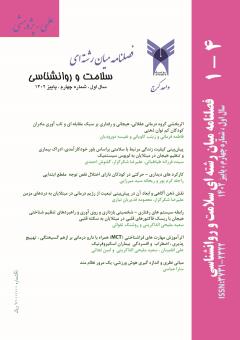نقش ذهن آگاهی و ابعاد آن در پیشبینی تبعیت از رژیم درمانی در مبتلایان به دردهای مزمن . (نویسندگان : علیرضا شکرگزار / معصومه قدیریان نیاری )
محورهای موضوعی : روانشناسی بیماری های مزمن
1 - استادیار-عضوهیئت علمی دانشگاه آزاد اسلامی واحد کرج
کلید واژه: تبعیت از درمان, ذهن آگاهی, درد مزمن,
چکیده مقاله :
چکیده این پژوهش با هدف پیشبینی تبعیت از رژیم درمانی براساس ذهن آگاهی و ابعاد آن در مبتلایان به دردهای مزمن انجام شد. پژوهش توصیفی-مقطعی و از نوع همبستگی بود. تمامی مبتلایان به درد مزمن مراجعهکننده به بیمارستانهای شهید رجایی و شهید مدنی شهر کرج در بازه زمامی 6 ماهه آخر سال 1401 جامعه آماری پژوهش را تشکیل دادند، که از بین آنها با روش نمونهگیری در دسترس تعداد 150 نفر انتخاب شد. گردآوری دادهها علاه بر چک لیست اطلاعات جمعیتشناختی با پرسشنامه ذهن آگاهی و پرسشنامه تبعیت از درمان انجام داد. تحلیل دادهها با روشهای آمار توصیفی، آزمون ضریب همبستگی و رگرسیون چندگانه با SPSS-v26 انجام شد. یافتهها نشان داد که بین ذهن آگاهی (642/0=r و 012/0>P) و مؤلفههای آن با تبعیت از رژیم درمانی همبستگی مثبت و معنادارای وجود دارد. تحلیل رگرسیون نیز نشان داد در بین ابعاد ذهن آگاهی به ترتیب بالاترین و پایین ترین توان جهت تبیین واریانس نمره تبعیت درمانی مربوط به دو عامل تمرکز (05/0P< و 174/0=β) و غیرواکنشی بودن (05/0P< و 096/0=β) بوده است. بنابراین، میتوان با ارائه مداخلات و آموزشهای به موقع و مناسب در راستای تقویت و اصلاح مهارت ذهن آگاهی در مبتلایان به درد مزمن میزان تبعیت از درمان را بهبود بخشید.
Abstract This research was conducted with the aim of predicting adherence to treatment regimen based on mindfulness and its dimensions in chronic pain sufferers. The research was descriptive-crosssectional and correlational. All patients with chronic pain referred to Shahid Rajaei and Shahid Madani hospitals in Karaj city in the last 6 months of 2011 constituted the statistical population of the study, of which 150 people were available by sampling method. Selected. In addition to the demographic information checklist, data collection was done with a mindfulness questionnaire and a treatment compliance questionnaire. Data analysis was done with descriptive statistics, correlation coefficient test and multiple regression with SPSS-v26. The findings showed that there is a positive and significant correlation between mindfulness (r=0.642 and P<0.012) and its components with adherence to treatment regimen. The regression analysis also showed that among the dimensions of mindfulness, the highest and lowest power to explain the variance of the treatment compliance score related to the two factors of focus (P<0.05 and β=0.174) and non-reactivity (P<0.05 and 096 /0=β) has been. Therefore, it is possible to improve the adherence to treatment by providing timely and appropriate interventions and training in order to strengthen and improve mindfulness skills in chronic pain sufferers
منابع
بدریزاده، افسانه؛ رضاییجمالویی، حسن؛ خانزاده، مصطفی؛ فروغی، سعید و ساکی، ماندانا. (1400). تبعیت از درمان دارویی در بیماران دیابتی نوع دوم و عوامل مرتبط با آن. مجله علوم پزشکی لرستان، 23(2)، 10-1.
بهرامیراد، مینو؛ رافضی، زهره و شکرگزار، علیرضا. (1397). نقش پذیرش درد با راهبرد مقابلهای هیجانمدار در افراد مبتلا به بیماری آرتریت روماتوئید. ششمین کنفرانس ملی توسعه پایدار در علومتربیتی و روانشناسی، مطالعات اجتماعی و فرهنگی.
سعیدی، نرگس؛ پورشاهآبادی، فریده؛ جرجانی، محسن؛ اکبریان، محسن و مفاخری، محراب. (1401). پیشبینی مؤلفههای درد مزمن براساس ذهنیسازی، تنظیم هیجان و همدلی در بیماران مبتلا به درد مزمن. مجله طب نظامی، 24(8)، 1516-1506.
سلاجقه، سوزان؛ امامیپور، سوزان و نعمتاللهزاده ماهانی، کاظم. (1398). الگوی ساختاری روابط بین ذهنآگاهی و بهزیستی روانشناختی براساس نقش میانجیگر راهبردهای تنظیم شناختی-هیجانی در زنان دچار سرطان سینه. مجله روانشناسی کاربردی، 13(49)، 98-77.
شکرگزار، علیرضا؛ سپاهمنصور، مژگان؛ امامیپور، سوزان و صالحی، مهدیه. (1399). مقایسه اثربخشی رواندرمانی مثبتگرا با درمان شناختی-رفتاری بر ادراک درد در مردان مبتلا به کمردرد مزمن. مجله سلامت جامعه، 14(4)، 54-45.
شیبانی، فرشاد؛ دباغی، پرویز؛ نجفی، شریف و رجایینژاد، محسن. (1401). اثربخشی درمان کاهش استرس مبتنی بر ذهن آگاهی بر مبتلایان به درد مزمن. مجله روانپزشکی و روانشناسی بالینی ایران، 28(2)، 195- 182.
طالبی، مریم. (1400). ارتباط بین ذهنآگاهی و استرس، افسردگی و نگرانی در زنان باردار مراجعه کننده به کلنیکهای زنان و زایمان شهر تهران. مجله پرستاری و مامایی، 19(6)، 458-449.
قانعی قشلاق، رضا؛ عبادی، عباس؛ ویسی رایگانی، علی اکبر؛ نوروزی، کیان؛ دالوندی، اصغر و محمودی، حسن. (1394). تعیین روایی ملاک مفیاس تبعیت از رژیم دارویی موریسکی در بیماران دیابتی نوع دوم. مجله توانبخشی در پرستاری، 1(3)، 32-24.
غلامعلی، بهزاد؛ کریمی، اکرم؛ روشنایی، قدرت اله؛ رضاپور، فروزان. (1394). تبعیت از درمان دارویی و عوامل مرتبط با آن در بیماران دیابتی نوع دوم. مجله آموزش و سلامت جامعه، 2(4)، 12- 1.
Bąk-Sosnowska, M., Gruszczyńska, M., Wyszomirska, J., & Daniel-Sielańczyk, A. (2022, February). The Influence of Selected Psychological Factors on Medication Adherence in Patients with Chronic Diseases. In Healthcare (Vol. 10, No. 3, p. 426). MDPI.
Barriga-Valenzuela, E., Caballero-Sepúlveda, C., Medina-Muñoz, E., Núñez-Cortés, R., Urrutia-Quezada, R., & Espinoza-Ordoñez, C. (2022). The influence of cognitive factors in relation to the patients' treatment adherence for non-specific chronic low-back pain. A case series. Journal of Bodywork and Movement Therapies, 29, 271-278.
Chowdhury, T., Dutta, J., Noel, P., Islam, R., Gonzalez-Peltier, G., Azad, S & et al. (2022). An Overview on Causes of Nonadherence in the Treatment of Rheumatoid Arthritis: Its Effect on Mortality and Ways to Improve Adherence. Cureus, 14(4).
Dhruva, S. S., Murillo, J., Ameli, O., Morin, P. E., Spencer, D. L., Redberg, R. F., & Cohen, K. (2023). Long-term outcomes in use of opioids, nonpharmacologic pain interventions, and total costs of spinal cord stimulators compared with conventional medical therapy for chronic pain. JAMA neurology, 80(1), 18-29.
Depp, C. A., Moore, D. J., Patterson, T. L., Lebowitz, B. D., & Jeste, D. V. (2022). Psychosocial interventions and medication adherence in bipolar disorder. Dialogues in clinical neuroscience.
Gaborit, M., & Massotte, D. (2023). Therapeutic potential of opioid receptor heteromers in chronic pain and associated comorbidities. British Journal of Pharmacology, 180(7), 994-1013.
Herbert, M. S., Tynan, M., Lang, A. J., Backhaus, A., Casmar, P., Golshan, S., & et al. (2022). An integrated mindfulness meditation and acceptance and commitment therapy intervention for chronic pain: Rationale, design, and methodology of a pilot randomized controlled trial of Acting with Mindfulness for Pain (AMP). Contemporary Clinical Trials, 106809.
Huang, L., Xu, G., Sun, M., Yang, C., Luo, Q., Tian, H., ... & Wang, Z. (2023). Recent trends in acupuncture for chronic pain: A bibliometric analysis and review of the literature. Complementary Therapies in Medicine, 102915.
Heath, L., Jebb, S. A., Aveyard, P., & Piernas, C. (2022). Obesity, metabolic risk and adherence to healthy lifestyle behaviours: prospective cohort study in the UK Biobank. BMC medicine, 20(1), 1-12.
Jakob, R., Harperink, S., Rudolf, A. M., Fleisch, E., Haug, S., Mair, J. L & et al. (2022). Factors Influencing Adherence to mHealth Apps for Prevention or Management of Noncommunicable Diseases: Systematic Review. Journal of Medical Internet Research, 24(5), e35371.
Marshall, A., Joyce, C. T., Tseng, B., Gerlovin, H., Yeh, G. Y., Sherman, K. J & et al. (2022). Changes in Pain Self-Efficacy, Coping Skills, and Fear-Avoidance Beliefs in a Randomized Controlled Trial of Yoga, Physical Therapy, and Education for Chronic Low Back Pain. Pain Medicine, 23(4), 834-843.
Moore, M. T., Lau, M. A., Haigh, E. A., Willett, B. R., Bosma, C. M., & Fresco, D. M. (2022). Association between decentering and reductions in relapse/recurrence in mindfulness-based cognitive therapy for depression in adults: A randomized controlled trial. Journal of Consulting and Clinical Psychology, 90(2), 137.
Mejia, O. A. V., Mendonça, F. C. C. D., Sampaio, L. A. B. N., Galas, F. R. B. G., Pontes, M. F., Caneo, L. F & et al. (2022). Adherence to the cardiac surgery checklist decreased mortality at a teaching hospital: A retrospective cohort study. Clinics, 77.
Natoli, S., Vittori, A., Cascella, M., Innamorato, M., Finco, G., Giarratano, A., ... & Cuomo, A. (2023). Raising Awareness on the Clinical and Social Relevance of Adequate Chronic Pain Care. International Journal of Environmental Research and Public Health, 20(1), 551.
Paul, J. E., He, H., Diep, J., Vanniyasingam, T., & Middleton, S. (2022). Preoperative Medication Management, Compliance and Adverse Events in Adult Patients Undergoing Elective Surgery: A Historical Chart Review. Open Journal of Anesthesiology, 12(3), 113-133.
Soyoon, K., & Ekaterina, M. (2022). From Compliance to Adherence in Diabetes Self-care: Examining the Role of Patient’s Potential for Mindful Non-Adherence and Physician-Patient Communication. American Journal of Health Promotion, 08901171211068401.
Ugarte-Torres, A., Pallares, C. D., Niruban, J. S., Smyczek, P., Gratrix, J., Strong, D., & Singh, A. E. (2023). Population-Level Provider Compliance With Provincial Treatment Guidelines for the Management of Gonorrhea in Adolescents and Adults in Alberta, Canada; 2000 to 2019. Sexually Transmitted Diseases, 50(1), 11-20.
Uchino, M., Yokoi, N., Shimazaki, J., Hori, Y., Tsubota, K., & Japan Dry Eye Society. (2022). Adherence to Eye Drops Usage in Dry Eye Patients and Reasons for Non-Compliance: A Web-Based Survey. Journal of clinical medicine, 11(2), 367.
Whitfield, T., Barnhofer, T., Acabchuk, R., Cohen, A., Lee, M., Schlosser, M & et al. (2022). The effect of mindfulness-based programs on cognitive function in adults: a systematic review and meta-analysis. Neuropsychology Review, 32(3), 677-702.
Yanez, B., Oswald, L. B., Van Denburg, A. N., Baik, S. H., Czech, K. A., Buitrago, D & et al. (2022). Rationale and usability findings of an e-health intervention to improve oral anticancer adherence among breast cancer survivors: The My Journey mindfulness study. Contemporary Clinical Trials Communications, 26, 100898.
Zhao, W., Zhao, L., Chang, X., Lu, X., & Tu, Y. (2023). Elevated dementia risk, cognitive decline, and hippocampal atrophy in multisite chronic pain. Proceedings of the National Academy of Sciences, 120(9), e2215192120.

